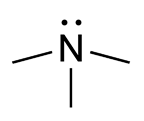Explore web search results related to this domain.

As bacteria in the gut aid in the digestion of specific proteins found in foods such as eggs, liver, legumes (including soybeans and peas), some types of fish and other legumes, trimethylamine is formed. Normally, the fishy-smelling trimethylamine is changed into the odorless trimethylamine-N-oxide ...
As bacteria in the gut aid in the digestion of specific proteins found in foods such as eggs, liver, legumes (including soybeans and peas), some types of fish and other legumes, trimethylamine is formed. Normally, the fishy-smelling trimethylamine is changed into the odorless trimethylamine-N-oxide by the FMO3 enzyme.The presence of the rotten-fish odor is indicative, especially in severe cases. However, diagnosis based on smell is unreliable because the odor is often episodic and not everyone can detect the smell of trimethylamine.Trimethylaminuria (TMAU) is a rare disorder in which the body is not able to metabolize the chemical trimethylamine, and this causes body odor. Trimethylamine has a characteristic rotten fish smell.The fish-odor smell is the obvious symptom; otherwise, affected individuals appear normal and healthy.
Smelling of fish? It’s Trimethylaminuria or Fish Odour Syndrome. Know what the symptoms of trimethylaminuria are, its diagnosis and what are the treatments available.

It's also called "fish odour syndrome". Sometimes it's caused by faulty genes that a person inherits from their parents, but this isn't always the case. There's currently no cure, but there are things that can help. Trimethylaminuria symptoms can be present from birth, but they may not start ...
It's also called "fish odour syndrome". Sometimes it's caused by faulty genes that a person inherits from their parents, but this isn't always the case. There's currently no cure, but there are things that can help. Trimethylaminuria symptoms can be present from birth, but they may not start until later in life, often around puberty. The only symptom is an unpleasant smell, typically of rotting fish – although it can be described as smelling like other things – that can affect the:Trimethylaminuria (TMAU) is an uncommon condition that causes an unpleasant, fishy smell.Read more about trimethylaminuria which is an uncommon genetic disorder that causes a strong body odour, usually described as like rotting fish, poo or rubbish.In trimethylaminuria, the body is unable to turn a strong-smelling chemical called trimethylamine – produced in the gut when bacteria break down certain foods – into a different chemical that doesn't smell.

A fishy or unusual vaginal odor isn’t always a cause for concern. But if you’re experiencing itching, pain, or other unexpected symptoms, it could point to an underlying condition like bacterial vaginosis. A healthy vulva and vagina may smell a bit like blood or copper, somewhat salty or ...
A fishy or unusual vaginal odor isn’t always a cause for concern. But if you’re experiencing itching, pain, or other unexpected symptoms, it could point to an underlying condition like bacterial vaginosis. A healthy vulva and vagina may smell a bit like blood or copper, somewhat salty or sweet, or musky.Bacterial vaginosis and other underlying infections can exacerbate these symptoms, making your post-sex smell more pungent than usual. In rare cases, a fishy odor may be the result of an inherited condition called trimethylaminuria.Urea, for example, is a byproduct of ammonia. It’s often associated with a chemical-like smell, though some may describe it as fishy.People who have trimethylaminuria are unable to process TMA as expected. This can cause your breath, sweat, urine, or vaginal secretions to smell rotten or fishy.


That's not a massive pile of sand you see but rather a massive amount of dead fish piled up in a lagoon in the Osborn Island neighborhood. Neighbors described the sight and smell as "absolutely disgusting."

For the second time this month, residents in the township of Little Egg Harbor are dealing with the stench of rotting fish in the water.
Fish backed up at the end of the lagoon. ... Because of the sight and smell, residents have not been able to enjoy their usual summer activities.The only ones appearing to enjoy the smelly phenomenon are seagulls, which have covered many parts of the township in bird feces and feathers, according to Pelcak. The New Jersey Department of Environmental Protection told FOX 29 that they couldn’t immediately determine the cause. However, neighbors reported that they've been told the issue lies upstream. Dead fish float on the water.LITTLE EGG HARBOR, N.J. – For the second time this month, residents in the New Jersey township of Little Egg Harbor are dealing with the stench of rotting fish in the water.Neighbors find the sight of the dead fish, which are bait fish known as "peanut bunkers", to be unbearable, as well.

Scallion oil, which is called pa gireum in Korean, is the star of this easy, foolproof preparation.
In turn, the oil will be tinted a vibrant chartreuse and perfumed with a scallion aroma. At this point, you can turn off the flame. The residual heat from that oil will softly poach the fish, leaving you with the silkiest texture — low splatter, low smell and low stress.“A fresh fish should have an oceanlike scent, not a strong fishy odor,” said Chris Addis, an owner of Fish Tales, a seafood market in the Brooklyn borough of New York City, adding that any skin “should be glistening and moist.” For this recipe, you may lean toward cod, halibut, black sea bass, haddock, flounder, tilapia or even lemon sole. But take Addis’ advice and grab whichever looks and smells the freshest that day.For nights when you want something gentler on the cook (and the fish), you can turn to this oil-poaching method, which turns out the most flavorful, tender fillets imbued with the deep savoriness of scallions.Cooking fish at home always begins at the store. You may already know the secret to great fish for dinner is getting to know your fishmonger, who not just sells the fish but also knows when it came in and where from.
Trimethylaminuria is a disorder in which the body is unable to break down trimethylamine, a chemical compound that has a pungent odor. Trimethylamine has been described as smelling like rotten or decaying fish. As this compound builds up in the body, it causes affected people to give off a ...
Trimethylaminuria is a disorder in which the body is unable to break down trimethylamine, a chemical compound that has a pungent odor. Trimethylamine has been described as smelling like rotten or decaying fish. As this compound builds up in the body, it causes affected people to give off a strong fishy odor in their sweat, urine, and breath.This compound is produced by bacteria in the intestine during the digestion of eggs, liver, legumes (such as soybeans and peas), certain kinds of fish, and other foods. Normally, the FMO3 enzyme converts strong-smelling trimethylamine into another molecule that has no odor.Trimethylaminuria is a disorder in which the body is unable to break down trimethylamine, a chemical compound that has a pungent odor. Explore symptoms, inheritance, genetics of this condition.Mitchell SC, Smith RL. Trimethylaminuria: the fish malodor syndrome. Drug Metab Dispos. 2001 Apr;29(4 Pt 2):517-21.

Trimethylaminuria, or fish odor syndrome (FOS), is a condition characterized by the presence of trimethylamine (TMA)—a tertiary amine whose odor is described as resembling that of rotting fish—in the urine, sweat, and expired air. The cause of the syndrome is rooted in the dysfunctional ...
Trimethylaminuria, or fish odor syndrome (FOS), is a condition characterized by the presence of trimethylamine (TMA)—a tertiary amine whose odor is described as resembling that of rotting fish—in the urine, sweat, and expired air. The cause of the syndrome is rooted in the dysfunctional metabolism of TMA,1 which is normally oxidized by flavin monooxygenase 3 (FMO3) into non-odorous trimethylamine-N-oxide (TMAO).2,3 In 1970, Humbert at el4 published the first case report of FOS; however, William Shakespeare’s description of a slave who smelled like fish in The Tempest may indicate that the condition was recognized much eariier.Trimethylaminuria, better known as fish odor syndrome, is a psychologically disabling condition in which a patient emits a foul odor, which resembles that of rotting fish. The disorder is most commonly caused by an inherited deficiency in flavin ...Genetic studies have estimated the incidence of heterozygous carriers to range from 0.5 to 11 percent depending on the ethnicity examined.7,8 Cases have been reported from nearly all parts of the world and in both sexes, although it seems that females, particularly those of African descent, may be over-represented.5,6 In childhood or early adulthood, afflicted individuals usually complain of body odor and/or halitosis and seek care from pediatricians, family doctors, or specialists, such as dermatologists. The odor may not always be pungent as patients may have learned to minimize the smell through simple measures, such as frequent bathing, so it is imperative that healthcare providers be cognizant of this disorder.The TMA passively diffuses across cell membranes12-14 and enters the enterohepatic circulation where it is removed by the liver. It is in the liver that FMO3 normally oxidizes TMA into odorless TMAO2,3; however, those afflicted with this condition lack adequate functional FMO3 and therefore experience an excess of foul-smelling TMA.

Find out why fish is so smelly and how to prevent and get rid of fish smells in your house and while cooking.
I’ve attributed it to my husband’s culinary prowess and my diligence in cleaning up, but it also comes down to something far more basic: We buy good, fresh fish. According to Bryan Szeliga, founder and owner of Fishtown Seafood Company, other than a few specific kinds, seafood is generally not supposed to smell bad.If you buy fresh, good-quality fish, you shouldn’t have any pungent odors in your kitchen. But to avoid any lingering fishiness after cooking, here’s what Logan Taylor, president and founder of The Dazzle Cleaning Company, suggests to get rid of fish smell in the house.For lingering fish odors, Taylor recommends placing a bowl of vinegar in the kitchen to remove the smell. I tried it post tuna fish sandwich and can confirm it works. Just pour a cup of distilled white vinegar into a bowl and leave it on the counter for at least a few hours or even overnight if the smell is strong.Don’t skip the vinegar bowl in favor of relying on air fresheners, candles, or incense, Taylor warns. You can use those methods to make the room smell good in general, but it doesn’t work as a remedy. “It just sort of masks [the odor], which is arguably worse than the fish smell on its own,” he says.

An angling association tells BBC News NI that "a mile and a half of the river is dead".
The number of fish affected has not been confirmed but the source of the pollution has been identified. David North from Mossley Mill Angling Association, which manages the Three Mile Water, told BBC News NI that "a mile and a half of the river is dead". He described a "chemical smell", with "dead fish in every pool".A fish kill is being investigated on the Three Mile Water near Newtownabbey in County Antrim.The NIEA is now carrying out a joint investigation with Daera's Inland Fisheries staff.It is understood many of both have been killed, from young fish to mature adults.
Freshwater fish generally do not accumulate TMAO because their environment is less salty than their cells.As a result their flesh tends to be milder, and they do not get as “fishy” as ocean fish.However, freshwater fish sometimes suffer from an unpleasant “muddy” aroma.This often occurs ...
The problem is that when fish are killed, bacteria and fish enzymes convert TMAO into trimethylamine (TMA), which gives off the characteristic “fishy” odor.This smell can be reduced in two ways.If you have ever caught fresh fish, you know that it doesn't have a particularly strong odor, maybe a hint of ocean or lake water. But sometimes the fish youTMA on the surface of the fish can be rinsed off with tap water.Treating the fish with acidic ingredients such as lemon, vinegar, or tomato can also cause TMA to bind to water and become less volatile.Thus the odor compounds do not reach the nose.Freshwater fish generally do not accumulate TMAO because their environment is less salty than their cells.As a result their flesh tends to be milder, and they do not get as “fishy” as ocean fish.However, freshwater fish sometimes suffer from an unpleasant “muddy” aroma.This often occurs in bottom-feeders such as catfish, and is caused by two compounds produced by blue-green algae (geosmin and methylisoborneol).These chemicals concentrate in the skin and dark muscle tissue of the fish.Acidic conditions will cause these compounds to break down, so there is good reason for the inclusion of acidic ingredients in traditional recipes.

Chemical reactions can also lead to fishy odors. This happens through the oxidation of lipids, or fat. Fish are an important source of omega-3 fatty acids. When these fats are exposed to oxygen, they oxidize and decompose into smaller, volatile molecules that you can smell, Decker explained.
It should "smell kind of like seaweed," said · Eric Decker, a professor in the Department of Food Science at the University of Massachusetts Amherst. Strong, fishy odors beyond this are the first signs of spoilage. Bacterial growth is usually the first culprit.Cold-water species, like cod and haddock, may develop this smell from TMA faster than others, Decker said. Get the world’s most fascinating discoveries delivered straight to your inbox. Fishy odor may also come from enzymes that break down once the fish is caught.Chemical reactions can also lead to fishy odors. This happens through the oxidation of lipids, or fat. Fish are an important source of omega-3 fatty acids. When these fats are exposed to oxygen, they oxidize and decompose into smaller, volatile molecules that you can smell, Decker explained.The less time between when the fish is caught and when it reaches the kitchen, the better. But today, fish are often flown across the globe. To keep smell-producing bacteria at bay, the fish must be frozen or kept at the lowest temperature possible as soon as it is caught and cleaned.


An angling association tells BBC News NI that "a mile and a half of the river is dead".
The number of fish affected has not been confirmed but the source of the pollution has been identified. David North from Mossley Mill Angling Association, which manages the Three Mile Water, told BBC News NI that "a mile and a half of the river is dead". He described a "chemical smell", with "dead fish in every pool".A fish kill is being investigated on the Three Mile Water near Newtownabbey in County Antrim.The NIEA is now carrying out a joint investigation with Daera's Inland Fisheries staff.It is understood many of both have been killed, from young fish to mature adults.
Have you ever wondered what it would take to make an entire neighborhood smell like a seafood apocalypse? Whether for an elaborate prank, a social experiment, or some misunderstood artistic endeavor…
Have you ever wondered what it would take to make an entire neighborhood smell like a seafood apocalypse? Whether for an elaborate prank, a social experiment, or some misunderstood artistic endeavor, here’s your detailed guide to making your neighborhood smell like dead fish — complete with sourcing, logistics, and the math behind it.The release of these gases increases with temperature and humidity, making summer the optimal time for maximizing the smell. These compounds are volatile and travel far, meaning a small amount of fish can go a long way, especially with the right wind conditions.To truly perfume the neighborhood, you need enough fish producing enough of these gases to cover a large area. Let’s break down the numbers: • Area of a typical neighborhood: ~1 km² (1,000,000 m²). • Wind speed: Assume a mild 3 m/s breeze to carry the smell.Given that 500 grams produce 500 ppm, you’ll need roughly 200 fish strategically placed throughout the neighborhood to reach 10 ppm. But for a truly overpowering experience, you’ll want to scale this up. Multiply this by 5 to ensure the smell sticks, meaning about 1,000 dead fish is the sweet spot.
When FMO3 is not working correctly or if not enough enzyme is produced, the body loses the ability to properly convert the fishy-smelling chemical trimethylamine (TMA) from precursor compounds in food digestion into trimethylamine oxide (TMAO), through a process called N-oxidation.
Trimethylamine is most noticeable in urine, as it is captured, concentrated and released in intervals. Fishy smelling urine is a primary identifying symptom in infant children (Trimethylaminuria literally meaning "trimethylamine in urine").Trimethylamine is also released in the person's sweat, reproductive fluids, and breath, and can give off a fishy odor when the concentration of trimethylamine is high enough to be detected. The intensity of the smell is directly correlated with the concentration of trimethylamine in the bloodstream.People with TMAU may have an intermittent fish-like body odor, depending on diet and the severity of their FM03 mutation. In a study by Wise PM, of 115 positively identified TMAU subjects, after a choline challenge load test (intentionally ingesting a TMA precursor) only 10% expressed a smell at a social distance.The FMO3 gene makes an enzyme that breaks down nitrogen-containing compounds from the diet, including trimethylamine. These compounds are produced by bacteria in the intestine as they digest proteins from eggs, meat, soy, and other foods. Normally, the FMO3 enzyme converts fishy-smelling trimethylamine into trimethylamine N-oxide which has no odor.Trimethylaminuria (TMAU), also known as fish odor syndrome or fish malodor syndrome, is a rare metabolic disorder that causes a defect in the normal production of an enzyme named flavin-containing monooxygenase 3 (FMO3). When FMO3 is not working correctly or if not enough enzyme is produced, ...

In fact, most cases of trimethylaminuria are caused by mutations within the FM03 gene. Bacteria in the stomach produce trimethylamine from the precursors of trimethylamine-N-oxide and choline. It has a fishy odour, but it is typically converted back into trimethylamine in the liver by an enzyme's ...
The International Journal of Advances in Nursing Management explains that in most people with trimethylaminuria, the FMO3 enzyme is missing or their FMO3 gene doesn't work because of genetic mutation. This allows trimethylamine to build up in the body and trimethylamine will release in a patients sweat, breath, urine, and genitourinary tract results in fishy odour or smell.Stomach bacteria produce trimethylamine from precursors like trimethylamine-N-oxide and choline, which give a fishy odor. Learn more.The International Journal of Advances in Nursing Management explains that Trimethylaminuria is a metabolic or inherited autosomal recessive disorder in which the body is unable to break down trimethylamine in to trimethylamine oxide which results in fish odour in mouth, sweat, reproductive secretions and urine.In fact, most cases of trimethylaminuria are caused by mutations within the FM03 gene. Bacteria in the stomach produce trimethylamine from the precursors of trimethylamine-N-oxide and choline. It has a fishy odour, but it is typically converted back into trimethylamine in the liver by an enzyme's actions.


According to Bryan Szeliga, founder and owner of Fishtown Seafood Company, other than a few specific kinds, seafood is generally not supposed to smell bad. Let's dive into why some fish smell more than others and, more importantly, how to get rid of fish smells in the house.
Each time we attempt a new fish recipe, I brace myself for lingering fishy odors, but I'm happy to say they've been practically nonexistent and I've never had to look up how to get rid of fish smells in the house. According to Bryan Szeliga, founder and owner of Fishtown Seafood Company, other than a few specific kinds, seafood is generally not supposed to smell bad.I've attributed it to my husband's culinary prowess and my diligence in cleaning up, but it also comes down to something far more basic: We buy good, fresh fish. According to Bryan Szeliga, founder and owner of Fishtown Seafood Company, other than a few specific kinds, seafood is generally not supposed to smell bad.You'll never hear me complain about the scent of sauce permeating our home, but fish is a different story. Each time we attempt a new fish recipe, I brace myself for lingering fishy odors, but I'm happy to say they've been practically nonexistent and I've never had to look up how to get rid of fish smells in the house.I'm glad for the vote of confidence that our local fish market serves only the good stuff. But I'll argue that our kitchen still smells different after cooking fish than any other protein or baked good.

There’s something fishy in this New Jersey town. Residents of Osborn Island in Little Egg Harbor have been forced to remain inside their homes as the pungent smell of rotting fish overwhelms the town.
People on Osborn Island in Little Egg Harbor have been forced to remain in their homes as the pungent stink of rotting fish has overwhelmed the town — it’s shore-ly cut into their summer fun. FOX 5 NY · “It’s disgusting, it is the worst smell in my entire life.People on Osborn Island in Little Egg Harbor have been forced to remain in their homes as the pungent stank of rotting fish has overwhelmed the town — its shore-ly cut into their summer fun.The New Jersey Department of Environmental Protection told CBS News that the agency “is aware of the fish mortality” and “determined that poor water quality resulting from warmer temperatures and low dissolved oxygen in the lagoon” caused the wave of deaths.Thousands of dead fish are floating up into a lagoon in the area.
When she was nine years old, she had undergone investigation for a strong odour of rotting fish, for which she was ostracized by her classmates. The smell had decreased after puberty, but she still noticed a strong fishy smell around the time of her menstrual periods and when she was eating ...
When she was nine years old, she had undergone investigation for a strong odour of rotting fish, for which she was ostracized by her classmates. The smell had decreased after puberty, but she still noticed a strong fishy smell around the time of her menstrual periods and when she was eating a choline-rich diet, such as fish and eggs.Three days later the smell disappeared. Laboratory testing showed that the patient’s liver and kidney functions were all within normal ranges. As would be expected with treatment with a lipid-lowering agent, there had been a decrease in her LDL cholesterol (from 6.9 mmol/L at baseline to 3.2 mmol/L, i.e., a 53.6% reduction). Primary trimethylaminuria (fish odour syndrome) was suspected.Trimethylamine produced within the intestinal tract is rapidly absorbed and is converted within the liver, by the action of flavin-containing monooxygenase 3, to trimethylamine N-oxide (Figure 1), which is then excreted in the urine. Affected individuals have a reduced capacity to metabolize trimethylamine into trimethylamine N-oxide. Excessive amounts of the volatile molecule are therefore excreted in the body fluids, which give off a strong fishy smell.Rosuvastatin contains a tertiary amine, which is similar in structure to trimethylamine, whereas none of the other statins, such as atorvastatin and pravastatin, have a tertiary amine structure. We hypothesize that rosuvastatin or one of its metabolites interacts with flavin-containing monooxygenase 3, competitively inhibiting the enzyme activity and exacerbating the fishy smell.







